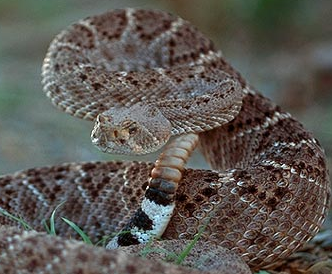No one knows for sure how many people are actually treated for venomous snakebite annually, but according to a Parks and Wildlife Department herpetologist, each state usually reports of one or two deaths per year. For those bitten who survive, treatment for rattlesnake bites reportedly runs anywhere from about $20,000 at the minimum up into the six-figure range. Anti-venom and treatment is very expensive! Young children out exploring and intoxicated young men make up a good chunk of the bite victims. Hikers and hunters also get bitten, as do those who work in and around snake habitat, especially when moving logs and rock piles.
and Wildlife Department herpetologist, each state usually reports of one or two deaths per year. For those bitten who survive, treatment for rattlesnake bites reportedly runs anywhere from about $20,000 at the minimum up into the six-figure range. Anti-venom and treatment is very expensive! Young children out exploring and intoxicated young men make up a good chunk of the bite victims. Hikers and hunters also get bitten, as do those who work in and around snake habitat, especially when moving logs and rock piles.
To keep you and your family safe, it’s important to be aware of your surroundings and to know which venomous snakes you might encounter where you live, work, and play. Texas has the most snake bites annually in the country, usually between 500 and 1,000. One-third to a half of those bites are venomous. Experts in the Lone Star State say you only need to worry about four species: western diamondback rattlesnake, copperhead, coral snake, and cottonmouth (also called water moccasin). Size does not matter because they are venomous at birth.
Coral snakes spend most of their time under leaves and logs and few people ever see them. They really aren’t a threat unless they are handled. Cottonmouths have black and white chins, float on top of the water and are not all that common. The copperhead is the only snake in Texas that is a two-color banded snake. The majority of venomous snakes sighted in residential yards are the diamondback. This rattlesnake sheds within 10 days of being born and then scatters. Babies end up in some strange places, like back steps and garages, looking for mice and lizards to eat, so you’re most likely to see this snake around homes and sheds. Adult diamondbacks want to stay away from activities and people. The most common snakes people encounter that are not poisonous are rat snakes—the only large snake that climbs.
Texas, of course, isn’t the only state with vipers. Oklahoma is home to five species of rattlesnakes. Three venomous species call Pennsylvania home— the northern copperhead, timber rattlesnake, and eastern massasauga rattlesnake. In California, where more than 800 humans are bitten each year, there are at least six types of rattlesnakes to be concerned about. Arizona has 13 species of rattlesnakes, and Nevada has six. Alaska is the only state that has never reported a venomous snake. For a list by state, visit http://www.venombyte.com/venom/snakes/venomous_snakes_by_state.asp
The best suggestions for avoiding snake bite is common sense and prevention. Don’t walk through tall grass. Places like flooded pastures create great breeding sites for frogs and feeding sites for frog hunters like snakes. Walk around rock piles and logs instead of stepping over them. If you see a snake, leave it alone. Remember that snakes are just as active in the fall as they are in the spring, so hunters should be extra cautious. No matter which state you live in, it makes sense to think about snake bite protection in advance of being outdoors — simply wear snake gaiters or snake boots. If you are bitten, below are a few do's and dont's suggested by medical professionals:
What to Do if You Are Bitten by a Snake
- Call 911 immediately.
- Stay as calm as possible.
- Get away from the snake but stay as immobile as possible until help has arrived.
- Remove clothing or accessories that may restrict your blood flow and cause swelling.
What Not to Do if You Are Bitten by a Snake
- Don’t try to capture the snake – this is unnecessary and can lead to a more dangerous situation.
- Don’t create an incision or suction the wound.
- Don’t administer any drugs to the victim.
- Don’t apply a tourniquet (restrictive device used to constrict the flow of blood to a body part).
- Don’t apply ice to the snakebite.
- Don’t wait to see if symptoms occur – seek professional medical help immediately!